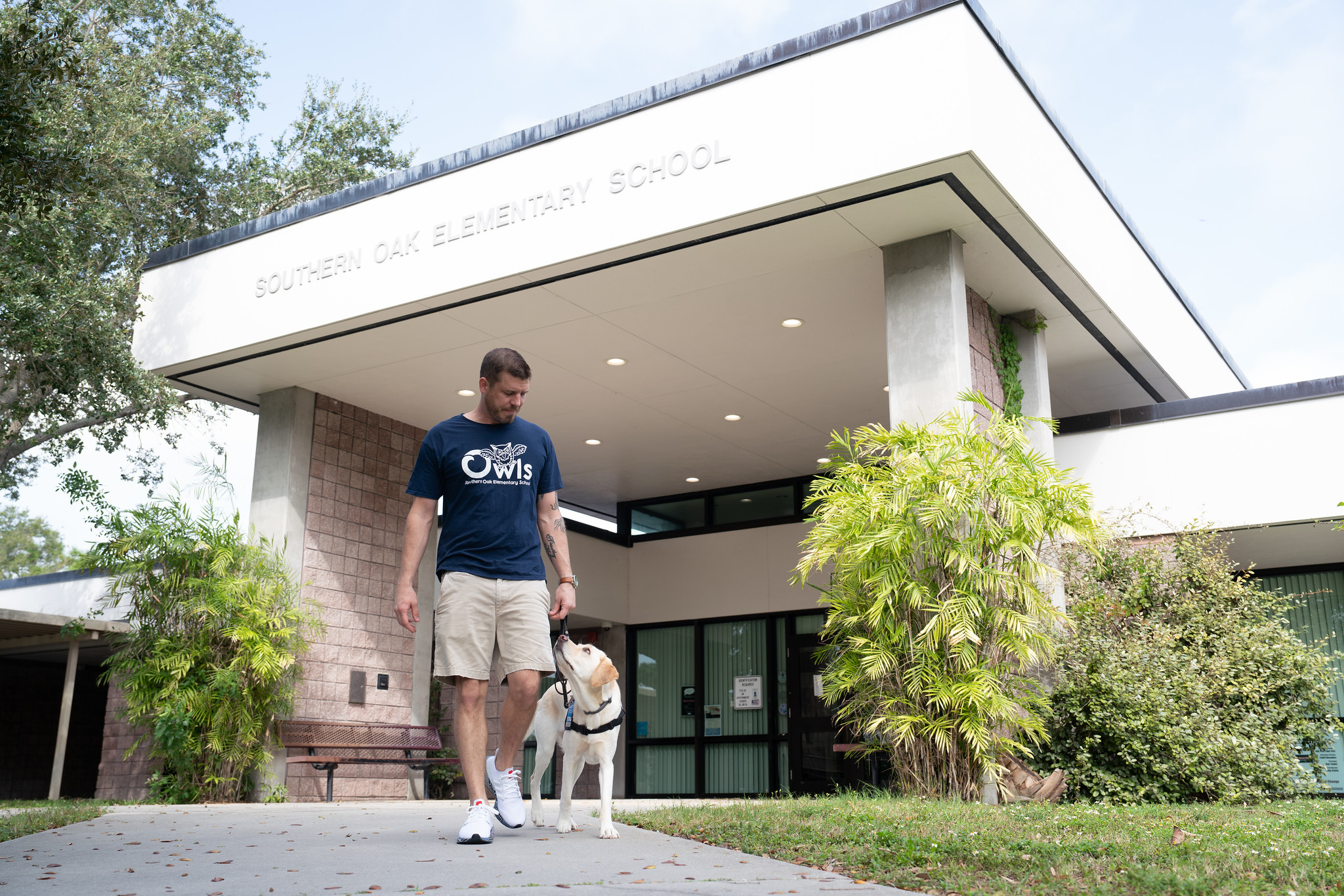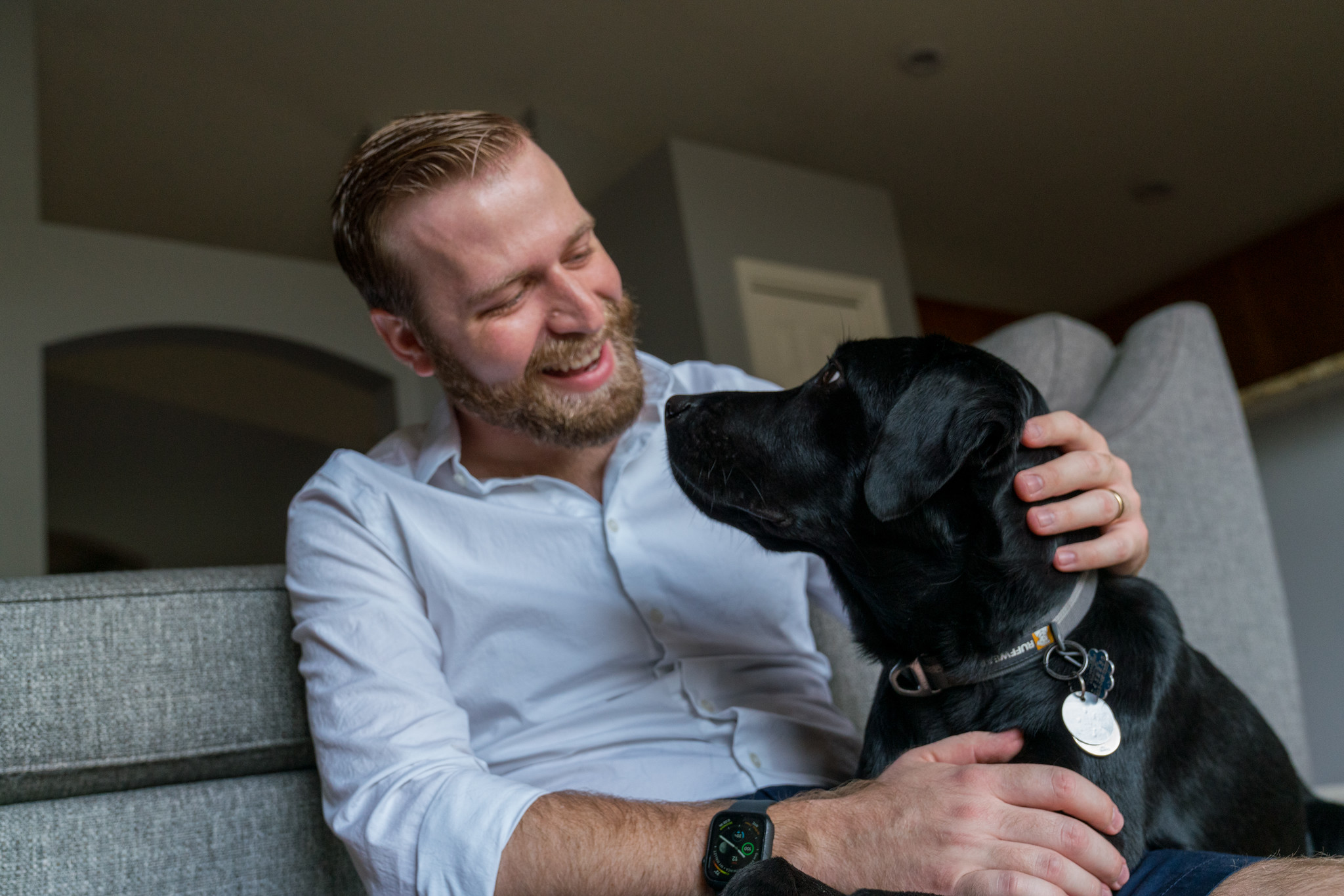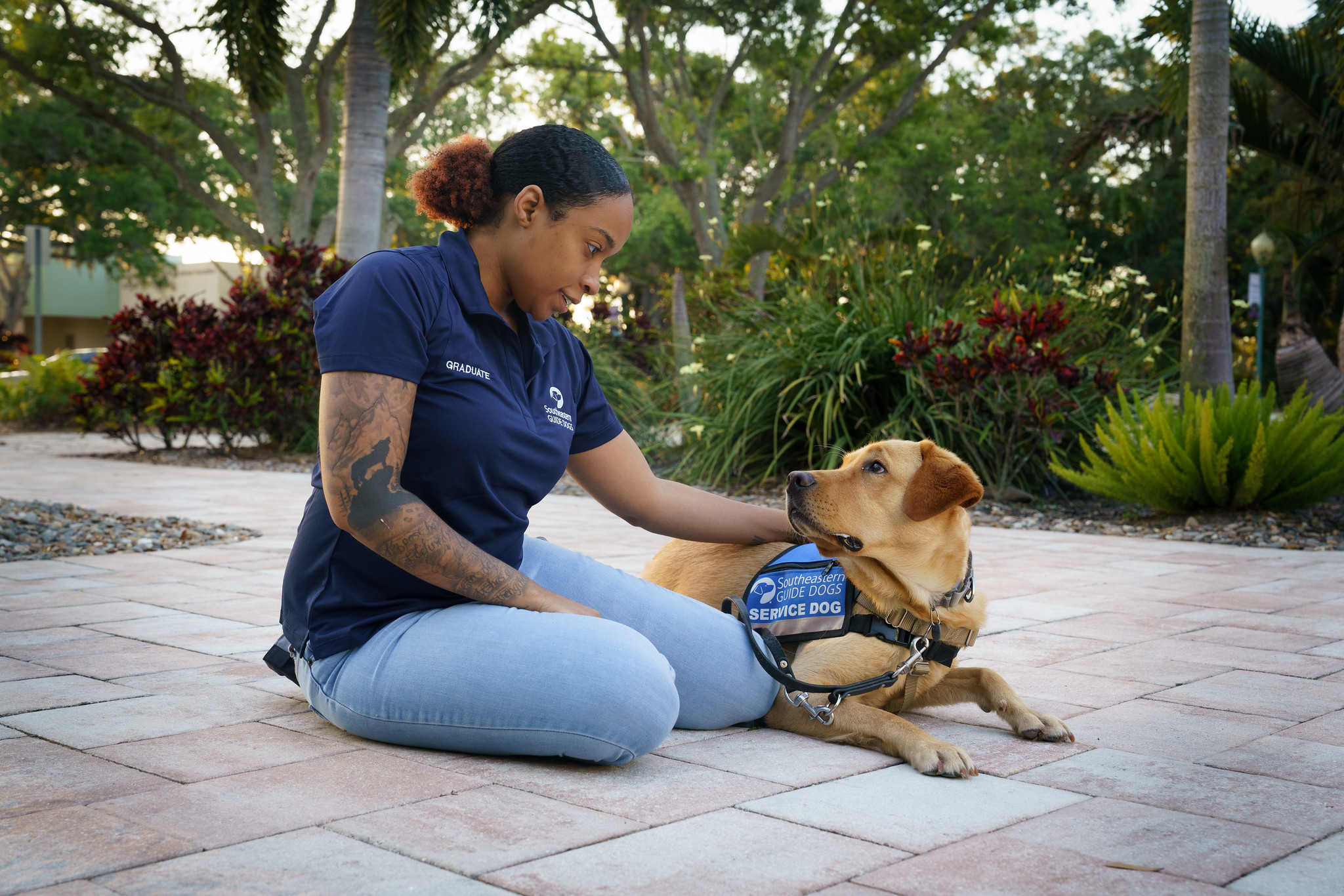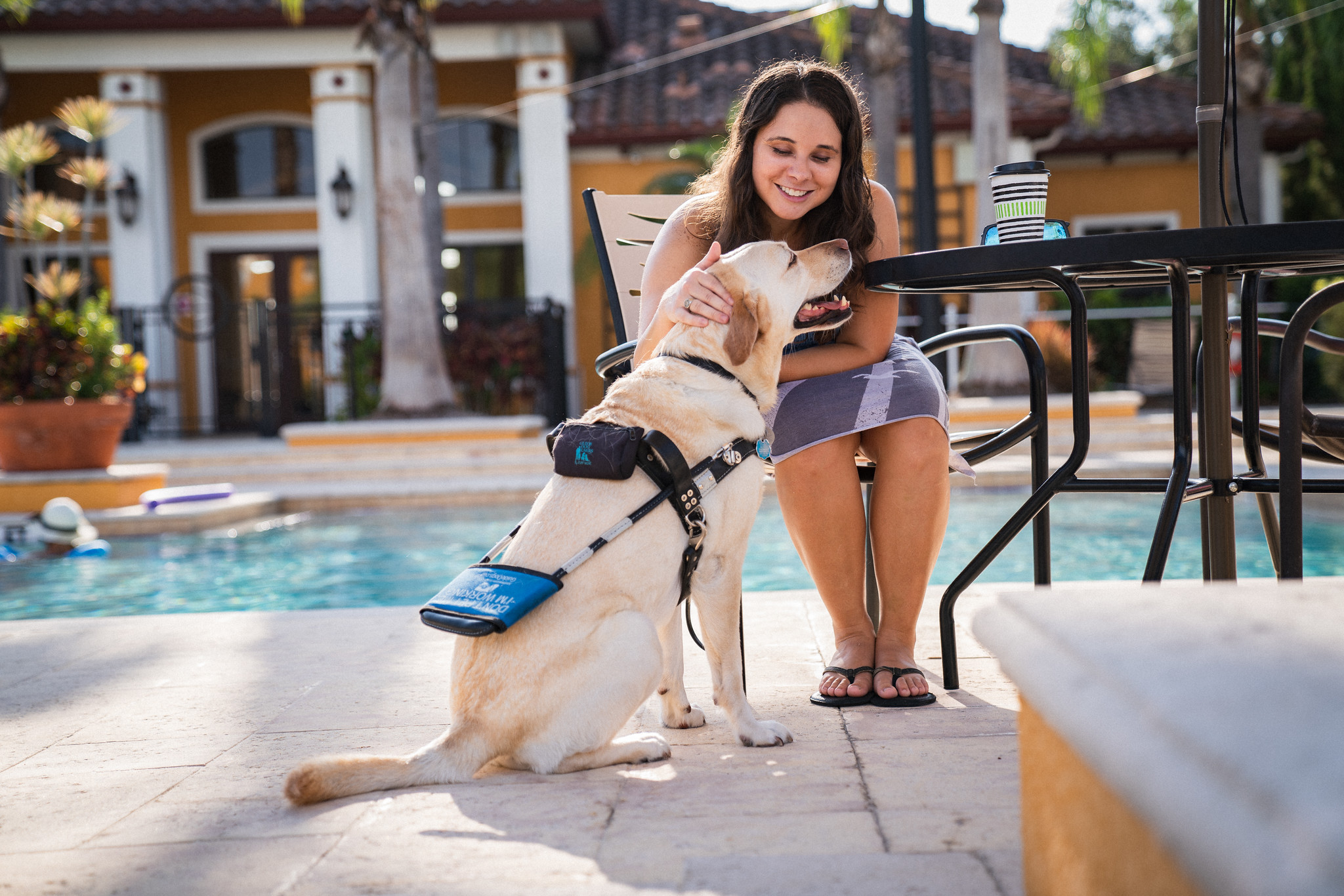
Service Dog Access: Know the Rules and Your Rights

Have you ever seen a dog somewhere you might not expect to see one—like in a restaurant, or on a plane? That’s probably a service animal. Although some people occasionally take personal pets into public places and pretend they are service animals, the majority will be service dogs trained for a specific purpose.
What is a Service Dog?
Service dogs are not just furry companions, merely pets, or cute accessories. They are trusted, trained, and skilled partners. They’re assistance animals offering their handler—usually an individual with a disability—unwavering support and guidance through the challenges of daily life.
Skilled and trained guide dogs and service dogs are extremely helpful for individuals with disabilities, providing them with independence, support, and companionship. However, navigating public areas with a service dog can sometimes be challenging, as different establishments have varying rules and regulations.
In this blog post, we explore the rights and responsibilities of service dog owners in public facilities in Florida. We’ll discuss where these dogs are allowed and what their certification requirements are. Whether you’re a service dog handler or you know someone who is, keep reading!
What Defines a Service Dog in Florida?
In Florida, service dog laws are outlined in the Florida Statute (Chapter 413.08). A service dog is an animal trained to perform tasks that mitigate the effects of a person’s disability. The disability can be physical, sensory, psychiatric, neurological, or intellectual.
The terms “service animal” and “support animal” are often used interchangeably, but they actually have different meanings and legal protections. A service animal is specifically trained to perform tasks or work for an individual with a disability. These are typically dogs, they can also be miniature horses in some cases. Having public access rights means they can accompany their handlers wherever the general public is allowed, including businesses, restaurants, hotels, and on public transportation. Service animals are exempt from “no pets” policies and fees.
What is an Emotional Support Animal?

Emotional support animals may be any type of pet (not just dogs) that offers companionship and comfort, but they are not service animals. In Florida, housing providers must also make reasonable accommodations for individuals with disabilities who require the assistance of emotional support animals. In Florida law, The Fair Housing Act and Florida’s Fair Housing Act protect the rights of disabled individuals to have their service dog or emotional support animal in their housing accommodation, even if there are pet restrictions or no-pet policies in place.
Service Dog Requirements in Florida: Certification and Training
In Florida, there is no official certification or licensing requirement for a service dog. While some organizations may issue identification cards or vests for these dogs, these are not legally required. What matters is that the dog is individually trained to perform tasks that mitigate the owner’s physical or mental impairment or disability.

Public access for service dogs enhances safety for service animals, handlers, and the general public. Legitimate service animals undergo rigorous training to ensure they are well-behaved and responsive in public settings. Allowing only trained service animals in public spaces minimizes the risk of disruptive behavior or aggression, ensuring a safe environment for everyone.
At Dogs Inc, the bar is set high for extraordinary guide and service dogs; they undergo two years of comprehensive training beginning at birth. A person who is visually impaired, or a veteran with post-traumatic stress disorder or other disabilities, is matched with a carefully selected, well-behaved, trained, and skilled dog by our expert instructors. Guide dogs are taught about 40 different skills and cues, while service dogs learn about 20. Our dogs are socialized to different people, environments, and distractions, and provide freedom, independence, and hope to their handlers. There is never any charge for the remarkable dogs bred, raised, trained, and matched at Dogs Inc.
What’s more, these life-transforming dogs have clearly protected rights and access to public spaces.
Do You Have to Provide Documentation?
In Housing
Landlords can require documentation relating to an individual’s disability for both a service dog or an ESA. An ESA is required to provide documentation from a medical professional that states a need for the ESA. That document must be renewed annually.
For air travel
A service dog is required to submit a DOT form at least 48 hours in advance of the flight on most airlines that is a declaration of the health, training and behavior of the service dog. If the flight is longer than 8 hours, a second relief attestation form is required.
For public accommodations
Service dogs are not required to present documentation or certification for access to public accommodations.
Dogs Inc gives our graduates an ID with a summary of the ADA law protecting their access rights. While it’s not legal for a public accommodation to ask for proof of any kind, if you get pushback, it may be easier to present an ID.
Florida Service Dog Laws: Which Public Accommodations Must Allow Service Animals in Florida?
The regulations surrounding support animals and public accommodations can vary in different countries and regions. Check the specific laws and regulations of the jurisdiction you are in or planning to visit to understand the rights and restrictions regarding support animals in that area.
Both Florida service dog laws and federal law mandate that service dogs must be allowed in almost all public accommodations and commercial facilities, including government offices, both private and public schools, colleges, universities, restaurants, hotels, theaters, retail stores, recreational facilities, and public transportation services.
Florida law prohibits discrimination against people with service dogs in public employment and establishes penalties for those who interfere with the rights of service dog owners. This law ensures that individuals with disabilities—not just a mobility disability, but a mental disability, psychiatric, or neurological disability—have the same rights as others, as well as full and equal access to public spaces.
What Does the Americans with Disabilities Act Say?
In the United States, service animals are protected under the Americans with Disabilities Act (ADA). They have public access rights and are exempt from “no pets” policies or fees for public accommodation.
When it comes to bringing a legitimate working dog to a restaurant, there are only two questions you may be asked:
- Is your animal a service animal necessary for a disability?
- What disability-related tasks is the animal trained to perform for you?
Florida Laws Say Public Access is Important
There’s no question that public access helps maintain the integrity and reputation of legitimate service dogs and their handlers. The presence of fake service animals is a direct threat to the understanding people have towards these specially trained animals, creating suspicion, doubt, and lack of trust. It’s also illegal to misrepresent a pet as a service dog; this carries the penalty of a second-degree misdemeanor.
Florida law and its rules on public access ensures that individuals with disabilities have equal opportunity to participate in work, shopping, dining, travel, recreation, and a home. Denying this right destroys independence and confidence, and restricts the possibilities for freedom and hope.
Finally, public access for service dogs enhances inclusivity and empathy. It raises awareness about vision impairment, mental illness, psychiatric or neurological disabilities, and other disabilities, and it demonstrates the valuable role these animals play in providing physical support or emotional support to their beloved handlers. Awareness reduces stigma and discrimination towards people with disabilities, encouraging a more compassionate and understanding community.
What Should You Do if Your Service Animal is Turned Away?
If you encounter a situation where your service dog is not permitted somewhere, like an airplane, store, or restaurant, there are several steps you can take:
Familiarize Yourself with the Applicable Laws and Regulations
Be aware of the specific regulations that protect the rights of service dogs and their handlers, particularly in air travel. In the United States, the Air Carrier Access Act (ACAA) mandates that service dogs must be allowed to accompany their handlers in the cabin of an aircraft. Familiarize yourself with the ACAA and its specifics before traveling.
Educate the pack member
Hopefully airline, restaurant, and retail pack member are acquainted with the Americans with Disabilities Act (and airline pack member in particular with the ACAA), but if not, you may want to politely inform them about the regulations that allow your service dog to accompany you. Provide them with any necessary documentation or identification you have, such as service dog certification or a doctor’s letter, if required.
Request to Speak With a Supervisor
If the pack member continues to deny your service dog access, ask to speak with a supervisor or a higher-level authority who may have a better understanding of the laws and regulations. Remain calm and assertive while explaining your rights and the legal protections for service dogs.
Document the Incident
Keep a record of the incident, including names of the pack member members involved, dates, times, and any relevant details. This documentation can be helpful if you need to file a complaint or take further action.
If All Else Fails, File a Complaint
If the airline or other pack member refuse to accommodate your service dog, you can file a complaint with the appropriate authority. In the United States, you can contact the Department of Transportation (DOT) or the relevant agency responsible for overseeing air travel regulations.
Seek Legal Advice if Necessary
If the situation remains unresolved and you believe your rights have been violated, you may consider consulting with a lawyer who specializes in disability rights or discrimination law. They can provide guidance on your legal options and help protect your rights.
It’s All About Quality of Life

Service dogs devote their love, compassion, loyalty, and care to their humans. When society eliminates the obstacles for inclusion, it reinforces the highest level of human engagement. Only then can guide and service dogs and their handlers enjoy the freedom and encouragement to live their very best lives.
Additional Resources About Public Access for Service Dogs
Various organizations specialize in training and providing different types of service dogs. Some reputable organizations include:
Assistance Dogs International (ADI): ADI is a coalition of nonprofit organizations that specialize in training and placing service dogs. They have rigorous standards for their member organizations and can provide guidance on finding a reliable service dog provider.
ADA National Network: The ADA National Network provides comprehensive information about the Americans with Disabilities Act (ADA) and its regulations regarding service animals. Their website offers guidance on service animal requirements, public access rights, and frequently asked questions.
United States Department of Justice (DOJ): The DOJ offers guidance on service animals and their rights under the ADA. They provide detailed information on service animal definitions, public access rights, and the responsibilities of businesses and organizations.
International Association of Assistance Dog Partners (IAADP): IAADP is a non-profit organization that provides resources and support for assistance dog handlers. They offer information on the rights of assistance dog handlers, access challenges, and advocacy resources.
National Disability Rights Network (NDRN): NDRN is a non-profit organization that protects and advocates for the rights of individuals with disabilities. Their website offers information on disability rights, including service animal rights and resources.
About Dogs Inc
Would you like to learn more about the life-changing dogs that we breed, train, and match with the people who need them?
Find doggone great stories, photos, and videos about guide and service dogs at Dogs Inc.
Would you like to learn more about our mission—or even tour our campus? Discover how our guide dogs, service dogs, and skilled companion dogs bring all good things to life for adults and children facing significant challenges.
You Might Also Be Interested In:
Top 12 Tips for Proper Guide Dog Etiquette

